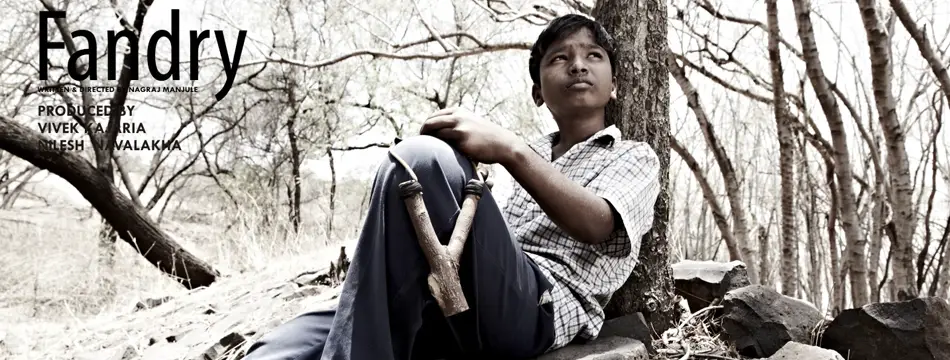Name / नाव FANDRY
Date of Release 7th February 2014
Genre DRAMA
Running Time 102 MINUTES
Box Office Collection / बॉक्स ऑफिस 10+ Crores
Actors / Star Cast / अभिनेते / अभिनेत्री- Kishore Kadam
- Chhaya Kadam
- Somnath Avghade
- Sakshi Vyavhare
- Aishwarya Shinde
- Pravin Tarde
- Bhushan Manjule
Fandry is an Indian Marathi movie released in 2014. It is a love story about the problems with caste discrimination that still looms large in the villages of India. It centres around a boy named Jabya (Somnath Awghade), how he fell in love with a girl named Shalu (Rajeshwari Kharat), and the problems that he had to encounter in his life due to his low caste.
Jabya is a teenage boy who resides in a village in the state of Maharashtra. At the beginning of the movie, we find that Jabya and one of his classmates is roaming around the village in an attempt to catch the Black Sparrow, a bird. Why they were trying to catch the bird has been explained later in the movie.
Jabya belonged to the lower Dalit caste. Hence, he and his parents were compelled to stay in an almost uninhabited corner of the village, far away from normal civilisation, since they are considered as untouchables by the villagers. The family lives in a poverty-stricken state, and needs to do all sorts of tasks such as catching pigs and sending them to the village to earn money and stay alive.
Jabya, despite being a teenager, sells ice candies to help his parents. While at school, he falls in love with Shalu, who belongs to an upper caste family. Since upper caste members are not allowed to interact with lower caste ones, Jabya tries to hide this. Jabya tries to impress her in several ways, but ultimately his aspirations are not fulfilled. Finally, one can get an idea about how intercaste discrimination, even in this modern era, is destroying the lives of thousands of villagers in India.
Fandry is director Nagraj Manjule’s debut film, about the problems encountered in villages due to the caste system. We think that education is the path to removing caste system, but the director shows us that this may not be always the right way. Jabya is constantly made fun of, called “blacky” by his classmates and also laughed at due to his parents’ occupation of catching pigs.
The title of the movie was well chosen as well, since “Fandry” actually means pig. Hence, one is left to wonder can these villagers be convinced ever that this caste system is pointless. The differences in the caste have been pointed out clearly in the movie. For example, the protagonist of the movie, Jabya is dark skinned, while the girl Shalu, being from an upper caste, is fair-skinned. Finally, one can realise the significance of trying to catch the sparrow.
Although Jabya was informed that it brings good luck, but it has an inner meaning as well. Jabya is bound to the shackles of this village life, and despite his efforts, he can never free himself. This shows that he can never get away from this intercaste discrimination, just as he was never able to catch the bird.
In the end, the movie Fandry must be watched by everyone; the director Nagraj Manjule has brilliantly portrayed how the dogmatic principle of this caste system still looms large in several villages throughout India, and the sufferings of the villagers. The dialogues, music and acting, together, make this a must-watch film.
- Sant Tukaram Best International Marathi Film award – Pune International Film Festival (PIFF) (2014)
- Fipresci – IndiaFilm CriticsAward for Best Indian Film (2014)
- Best Film – Mata Sanman (2014)
- Director : Nagraj Manjule
- Written By: Nagraj Manjule
- Camera: Vikram Amladi
- Costume Designers: Gargee Kulkarni, Priyanka Dubey
- Editor: Chandan Arora


Mala he film bagun maze love story aatwate thanks Rinku and Nagraj dada maze aarche pan ashe deste so thanks maz pram aatwun daily badal
nice Akash and Rinku